|

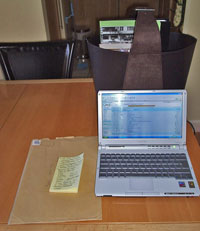  irginia Woolf wanted one in 1929; and almost 80 years later, I'm still looking for a room of my own to create my masterpiece. For the most part, I settle for the kitchen table to crank out non-fiction articles. Does this make me any less professional? Of course not! What I've come to realize about my writing space is that while a room of my own would be nice, I can get by on much less. Truly, a writing space of my own is all that I need. irginia Woolf wanted one in 1929; and almost 80 years later, I'm still looking for a room of my own to create my masterpiece. For the most part, I settle for the kitchen table to crank out non-fiction articles. Does this make me any less professional? Of course not! What I've come to realize about my writing space is that while a room of my own would be nice, I can get by on much less. Truly, a writing space of my own is all that I need.
 But what about other writers? Are we women content with our workspaces, or do we long for something more? I decided to go straight to the source and ask women around the world what they need to create a great writing space. The answers, it seems, are as unique as each woman's manuscripts! Let's start with Amy in NY, NY. But what about other writers? Are we women content with our workspaces, or do we long for something more? I decided to go straight to the source and ask women around the world what they need to create a great writing space. The answers, it seems, are as unique as each woman's manuscripts! Let's start with Amy in NY, NY.
Amy Leclair
Academic writer
New York, New York
BETH: Amy, what kind of writing space do you occupy now?
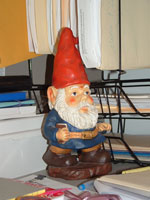 AMY: I write mostly in my office, which is a shared academic office. I've got a bookshelf above me with my most important stuff, so I can glance up and flip through the pages if I need a quick reference. A lot of the offices here (at NYU) look a bit like bus stops, so my office mate and I have made a conscious effort to make ours more homey and inviting. I have my "grad student gnome," a metallic tumbler with coloured Sharpie fine point markers, loads of teeny-girl magazines under my desk (for my research), a snack drawer to one side and random photographs and postcards tacked to the wall. There's a spare yoga mat lying around that I guess could be used for a stretch but is more often used for naps under the desk. Sometimes we'll opt for "productive light" - we shut off the overhead fluorescents and turn on all the lamps for warmer lighting. AMY: I write mostly in my office, which is a shared academic office. I've got a bookshelf above me with my most important stuff, so I can glance up and flip through the pages if I need a quick reference. A lot of the offices here (at NYU) look a bit like bus stops, so my office mate and I have made a conscious effort to make ours more homey and inviting. I have my "grad student gnome," a metallic tumbler with coloured Sharpie fine point markers, loads of teeny-girl magazines under my desk (for my research), a snack drawer to one side and random photographs and postcards tacked to the wall. There's a spare yoga mat lying around that I guess could be used for a stretch but is more often used for naps under the desk. Sometimes we'll opt for "productive light" - we shut off the overhead fluorescents and turn on all the lamps for warmer lighting.
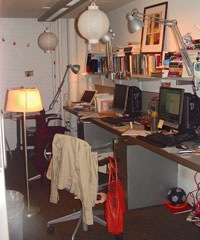 BETH: What kind of equipment do you need to be productive? BETH: What kind of equipment do you need to be productive?
AMY: Mostly, I just need the computer and either academic articles and books or the notes I've taken on them. I rarely do paper and pen writing. I look up stuff online constantly, moving from MSWord to Internet. I also benefit immensely from the presence of other people. When I'm really trying to write something, I often plug my headphones into the computer and listen to music. I like to literally be plugged in, to be one with the computer, so I can focus intensely
BETH: So, what are the things you think are most important for a writing space?
AMY:
Access to a bathroom
Access to caffeinated beverages
Sunlight
Music
A printer
BETH: What about the things that should NOT be in a writing space?
AMY:
A television
Cigarette smoke
Screaming children
BETH: Well, we're going to have to agree with you--good choices Amy, and thanks for your input.
 Let's cross the Atlantic and talk with Cristie in London. Let's cross the Atlantic and talk with Cristie in London.
Christie Creegan
Author of "Meeting Damien Lewis" and "The Circle"
London, England
BETH: Christie, what does your writing space look like?
CHRISTIE: I work on a fairly soul-less pine desk with a slated folding chair which hurts my bottom. I was left the desk by the previous owner of my 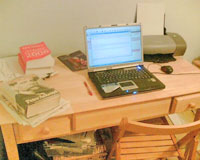 flat and haven't got round to getting rid of it. The uncomfortable chair creaks a bit but for some reason I have never bought a new one. No one can access my office unless I have a guest to stay. The desk is in a bright and sunny room, which doubles as my spare bedroom. flat and haven't got round to getting rid of it. The uncomfortable chair creaks a bit but for some reason I have never bought a new one. No one can access my office unless I have a guest to stay. The desk is in a bright and sunny room, which doubles as my spare bedroom.
 I grandly call it my office but really, it is clearly a bedroom overlooking the car park of a block of flats. I get a fair bit of noise drifting up so I often close the blinds and curtains and if I am really engrossed in what I am doing, I forget to turn the light on and work in semi dark. My desk faces the wall, which is not ideal but is less distracting as I would always be looking out the window. I just use a laptop but possibly need to upgrade. I grandly call it my office but really, it is clearly a bedroom overlooking the car park of a block of flats. I get a fair bit of noise drifting up so I often close the blinds and curtains and if I am really engrossed in what I am doing, I forget to turn the light on and work in semi dark. My desk faces the wall, which is not ideal but is less distracting as I would always be looking out the window. I just use a laptop but possibly need to upgrade.
BETH: And what would your ideal writing space look like?
CHRISTIE: Ah now...! I am planning to move and know EXACTLY what my ideal workspace would be. Quiet, but not too quiet. Gentle birdsong perhaps, or very low music. I would be at the top of the house or block and near a window but possibly not looking out of it. Perhaps, if it was an attic room, I would sit under the dormer window and be able to glance up at the sky, feel and see the rain spatter the window and be able to pull down a blind if need be. The telephone should be within earshot but not on the desk. I don't like working with my back to the door - it is supposed to be bad feng shui but also I think it cricks the neck looking over the shoulder.
 I hate hearing loud conversations when I am writing or deep in thought so working in large office with people on mobiles would and has driven me nuts. I don't like total silence though - that is in itself distracting. I'd like to be tidier; so I suppose, I would have a better filing system or something to keep the clutter off my desk. I wrote my first novel 'Meeting Damian Lewis' in my old flat, which was in an attic. I just had one room - living room/kitchen but the book almost wrote itself so peaceful was the environment. I hate hearing loud conversations when I am writing or deep in thought so working in large office with people on mobiles would and has driven me nuts. I don't like total silence though - that is in itself distracting. I'd like to be tidier; so I suppose, I would have a better filing system or something to keep the clutter off my desk. I wrote my first novel 'Meeting Damian Lewis' in my old flat, which was in an attic. I just had one room - living room/kitchen but the book almost wrote itself so peaceful was the environment.
BETH: You hit it right on head! Peace... Christie, thanks so much your participation in seeing how unique we are, while sharing our writing sisterhood.
 Now, let's see how its done in Israel. Now, let's see how its done in Israel.
Liza Rosenberg
Technical writer and blogger
Karkur, Israel
BETH: Liza, where do you work?
LIZA: I'm currently working on the 5 th floor of a seven-story building in Tel Aviv. I share an office with one person. My personal workspace consists of an L-shaped desk with a high-backed office chair. On my desk I've got my laptop computer in a docking station, a flat-screen monitor, keyboard, mouse, keyboard pad and mouse pad, telephone, a Hebrew-English dictionary, various office supplies, and my Norway coffee cup. There's a company-supplied framed print on the wall, as well as a postcard from Norway and my Stress Release Kit. I lock my computer whenever I get up so that no one else can access it - more because I am a private person than being worried about people using the computer in my absence.
BETH: And what do you need to have in your writing space to work productively?
LIZA: Not much - a computer and good music (though sometimes the music gets turned down or off if I really need to focus on something technical). I use MS Word's built-in thesaurus most of the time, but sometimes turn to an online thesaurus if I'm not satisfied with the results I get in Word.
BETH: Do you personally long for a writing room of your own?
LIZA: I don't long for my own writing room. I long for my own, personal laptop (as opposed to the company laptop I'm currently using), so that I can turn it on and start writing whenever the mood strikes me.
BETH: Liza, you're so right...that's every writer's dream.
 Well, we're coming full circle by closing on NY, NY again. Well, we're coming full circle by closing on NY, NY again.
Raquel Fleming
Press release writer and aspiring novelist
New York, New York
BETH: Raquel, could you describe your writing space?
RAQUEL: I have two workspaces for writing. The first is my office at work. I am employed with an investment firm and my desk, made out of cherry-wood, is 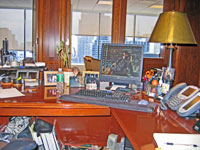 generous in size with many personal artefacts surrounding me. My desk faces downtown Manhattan and I can actually see the Empire State Building from my window. I have quite a lot of room to spread out papers and books while I'm writing. The atmosphere can get a bit hectic since I am at work, and have other responsibilities I must put first before my writing. generous in size with many personal artefacts surrounding me. My desk faces downtown Manhattan and I can actually see the Empire State Building from my window. I have quite a lot of room to spread out papers and books while I'm writing. The atmosphere can get a bit hectic since I am at work, and have other responsibilities I must put first before my writing.
 My second workspace is at home. The area isn't as spacious as my desk at work, but it's very quite, cosy and a great place to get lost in the thought process of my writing. I either work on my computer desktop, or I change over to my laptop and get comfortable on my couch. My second workspace is at home. The area isn't as spacious as my desk at work, but it's very quite, cosy and a great place to get lost in the thought process of my writing. I either work on my computer desktop, or I change over to my laptop and get comfortable on my couch.
BETH: What is your reaction to Virginia Woolf's idea that a woman needs "a room of one's own" in order to produce quality writing?
RAQUEL: I totally agree with Virginia Woolf's objective. A woman needs a personal space, which allows her to arrange ideas and keep information and facts needed to help in the writing process. It's also imperative to write in an area that you don't have to share with anyone else. Having a space that you know where everything is located and all your essentials are kept confidential is vital to produce good, quality writing.
BETH: What do you think should never be in a writing space?
RAQUEL:
Music or TV accessibility (can get distracting)
Access to the Internet
Heavy foot traffic where people are coming and going
Too many items on your writing surface (multiple computers, a lot of desk accessories)
Cell phone/Blackberry
 Unfortunately, no one can tell writers exactly how to format their workspaces for optimal output, but the flip side is that each writer should decide for herself where she works best. Unfortunately, no one can tell writers exactly how to format their workspaces for optimal output, but the flip side is that each writer should decide for herself where she works best.
 While writing spaces may well reflect the personality of the writer, more than anything they are functional areas where real work can be done. Decorative touches and creature comforts may make an appearance, but they are simply window dressing to the work that goes on within. While writing spaces may well reflect the personality of the writer, more than anything they are functional areas where real work can be done. Decorative touches and creature comforts may make an appearance, but they are simply window dressing to the work that goes on within.
 No matter what a space looks like, if it is the one place where you find you are productive, then claim it as your own--and never let it go. pproach your writing space with an open mind and be flexible in finding out what works best for you. Good luck! No matter what a space looks like, if it is the one place where you find you are productive, then claim it as your own--and never let it go. pproach your writing space with an open mind and be flexible in finding out what works best for you. Good luck!
Beth Morrissey has written well over 200 articles on various subjects, in publications around the world. She's been a Freelance Writer for 3 years, with experience in print and electronic publications. Beth is an editor of various educational materials including essays, reports and brochures, two organizational newsletters and children's books. She's also experienced in American and British English copy-editing, proofreading, as well as content editing.
Contact information: Email Address: beth.morrissey@bethmorrissey.com |